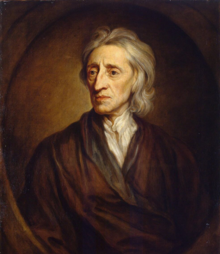
Few men produced ideas more influential to the founding of this country than the English philosopher John Locke (1632-1704) . The most famous in the Declaration of Independence–“We hold these truths to be self-evident, that all men are created equal, that they are endowed by their Creator with certain unalienable Rights, that among these are Life, Liberty and the pursuit of Happiness”–echoes many of Locke’s most important ideas.
Locke’s philosophy (and in some places, theology) of government includes seminal concepts like these:
1. All men are born under natural law, a law which comes from God and can be known by all rational creatures.
2. This law requires us to preserve, protect, and work for the flourishing of human life.
3. Because of this natural law, no one has the right to arbitrarily take another man’s life.
4. All men, therefore, are born free, with a God-given right to life, liberty, and property.
5. All men are born equal, not in an absolute sense of equality, but in the sense that they are by nature free.
6. The natural state of liberty is threatened by the persistent evil of man. We consent to be governed and join civil society to gain protection from the evils of others and because we are prone to wrongdoing ourselves.
7. The proper role of government, then, is to safeguard my life and liberty and that of my neighbor.
Here is how Locke puts it in greater detail:
If man in the state of nature be so free, as had been said; if he be absolute lord of his own person and possessions, equal to the greatest, and subject to no body, why will he part with his freedom? Why will he give up this empire, and subject himself to the dominion and control of any other power?
To which it is obvious to answer, that though in the state of nature he hath such a right, yet the enjoyment of it is very uncertain, and constantly exposed to the invasion of others: for all being kings as much as he, every man his equal and the greater part no strict observers of equity and justice, the enjoyment of the property he has in this state is very unsafe, very unsecure. This makes him willing to quit a condition, which, however free, is full of fears and continual dangers: and it is not without reason, that he seeks out, and is willing to join society with others, who are already united, or have a mind to unite, for the mutual preservation of their lives, liberties, and estates, which I call by the general name, property.
The great and chief end, therefore, of men’s uniting into commonwealths, and putting themselves under government, is the preservation of their property. To which in the state of nature there are many things wanting (Two Treatises, Sections 123-24).
Granted, John Locke is not our Constitution, even less some authoritative creed for Christians. But it would be good for us to look at our first principles of politics rather than just disagreeing on the latest hot button issue or quarantining our theology of government as if Christians shouldn’t talk of such things.



